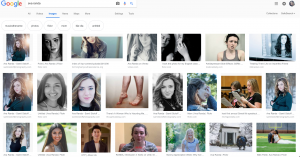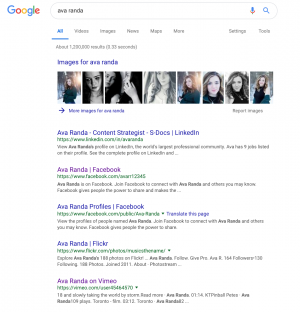Ava Randa
Contents
Introduction
A child of the digital age, I’ve been using the Internet ever since I can remember. My parents created my own email address when I was eight years old. Both my email, and the websites I was frequenting at this age, were monitored by my parents, and they were exercising what David Shoemaker calls “the control theory,” keeping my youthful identity as anonymous as possible. Despite any anonymity, I’ve technically had a digital footprint since elementary school.
Despite what may or may not have appeared about ‘Ava Randa’ online 10 or even five years ago, a lot of information about me is now available on the Internet. If there’s anything this readily available information tells people, it’s that I’m just another girl with a lot of interests, who frequents the Internet.
Google Search
Creative Endeavors
I have quite the digital presence. In high school I was an avid user of Flickr, and at the time, I even thought I was going to pursue a career in Photography. Because of that, I was okay with putting my first and last name on my account.
The fourth site listed when I Google myself is my Flickr, and a majority of the photos that appear on my Google search are also from that account. I licensed the majority of my photos under Creative Commons, so bloggers and newspaper writers all around the world have used my images for their articles. Even though I don’t post on Flickr as much as I used to (perhaps once every four months now, versus every week), it’s surprising to see that my older photos are the first to show up.One of my favorite photographers in high school, Rosie Hardy, emphasized that self-portraits were a great way to experiment and grow as a photographer. At the time, since I had no one willing to model, I took her advice, and took conceptual self-portraits. Although these photos are not inappropriate, they’re certainly “creative” and I can’t help but chuckle when they’re the some of the first photos that appear in my Google Search. As I’ve transitioned from someone who once a conceptual artist to one who is more practical (for lack of a better term), I want to explore the possibility of changing my Google Image results by attempting to popularize more “standard” photos of myself. What that involves is something I will figure out in my own time. However, Google displays [normal] photos of me taken by my photographer friends, articles about my accomplishments in current and past student organizations, photos that I took for The Michigan Daily from when I used to work there, and my name listed as a relative in obituaries.
Other information about myself that is immediately available and on the first page of the Google Search is my LinkedIn, Facebook, Vimeo, and one of my many (but less used) Youtube accounts. Since all of these accounts have my first and last name, I am not surprised that they appear.
A couple Google pages in, and you can find some of the articles I wrote for The Odyssey Online. My time writing for the Odyssey was short lived, approximately 6 months, and even though my account has been deactivated for 3 years, none of my articles were ever taken down (quite unfortunately).
A lot comes up when you Google ‘Ava Randa.’ There’s nothing on Google about me that is too shocking. I’ve carefully curated my digital presence in such a way where I have always aware that anyone could find anything once it’s online. It is somewhat rewarding to see how strong of a creative presence I have maintained online. Unfortunately, my personal website for photography, videography, and UX (ava-randa.com) appears absolutely nowhere on the first few pages of my Google search. However, I suppose this is an SEO problem. Still, I’m surprised it isn’t attached to my name like Flickr, The Michigan Daily, or The Odyssey.Google and Privacy
Aside from my creative work, I’ve always been quite “private” on my other social media. Almost always, I keep my Facebook, Twitter, and Instagram private, only letting people I personally know in on my digital life. Even though I use the protective privacy settings, I don’t think I’ve ever posted anything too personal that could jeopardize my reputation or safety. My Twitter account is perhaps the most “scandalous” of them all (but not really), since a lot of what I post on there is less intellectually stimulating, and more for laughs. I share the same sentiment that Floridi explains in Information Friction, “it is not that we do not care about privacy, but that we accept that being online may be one of the less private things in our life.” [1]
It’s curious that my other Youtube accounts, which do not have my last name, but were once linked to my other social media accounts (like Flickr and Twitter) do not appear. I’m also shocked that my Twitter doesn’t appear either; even though it is now a private account, and I have removed my last name, I’m still surprised there are immediately available remnants of it on Google. However, I suppose this shouldn’t be of much surprise if I consider Shoemaker’s “limitation theory” which says that, the availability of information depends, well, on the availability of that information. If I’ve made an effort to make that information less available, only granting specific people access to it, it makes sense that only those few people have that access. Interestingly enough, information about my address and my family is available online and through Data brokers even though I never explicitly made that information available; I will discuss this in more depth down below.
Data Broker
My personal report form the data broker was also nothing out of the ordinary, given my digital presence. The report from InstantCheckmate had few inaccuracies. The possible relatives who were listed were correct. My deceased grandparents and uncle were listed, as well as my parents (who are alive). I’m assuming this information was collected and grouped that way because of their digital obituaries. My grandmother, who is alive, was listed as a “possible associate” because she shares my home address, but was not listed as a relative.
Everything else from my data broker report was fairly accurate. I was surprised to see that under possible education it had listed my previous potential majors. This was startling until I remembered that every time I officially or unofficially changed my major at Michigan, I had also changed it on my LinkedIn. It is interesting, however, that the databroker was able to get a hold of that old information, but that my once public Twitter does not appear on Google or even on the data broker.
Conclusion
Searching “Ava Randa” on Google or using a data broker does not tell an intricate story. There’s no information about my salary since I have yet to start a full-time job. One could maybe assume that my family is in the upper-middle class given my address, and my education. If you look at my LinkedIn you’ll see that I’m a student at the University of Michigan (also from Michigan) who is interested in pursuing UX. My various creative accounts embody my artistic side. Old articles from The Odyssey Online are also examples of my early writing days. Other than that, Ava Randa is just another college girl, residing in Michigan, with hopes and dreams.
References
- ↑ “5, Privacy.” The 4th Revolution: How the Infosphere Is Reshaping Human Reality, by Luciano Floridi, Oxford University Press, 2016, pp. 110–110.

